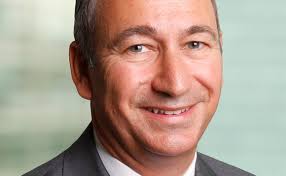
The London Stock Exchange Group has agreed to buy a business and financial information provider to support its core index business, which was also boosted by building a new green industry data model this year.
The UK exchange said in a statement yesterday that it has signed an agreement to acquire Mergent, a provider of business and financial information on public and private companies. Mergent provides data and analysis on 385,000 corporate bonds, 3.6 million US municipal bonds and 250 million public and private companies to more than 4,000 customers worldwide including investment firms, brokerage houses and law firms.
Mergent will form part of the exchange’s Information Services Division, which includes index provider FTSE Russell and other real-time and reference data products, such as UnaVista and RNS.

Mark Makepeace, FTSE Group
Mark Makepeace, group director of information services and chief executive of FTSE Russell, said in a statement: “The acquisition of Mergent supports the continuing strong growth of FTSE Russell and LSEG’s data services. Mergent will broaden our range of data services, research and analytics to meet the increasing demands of our clients for benchmarks and related data and analytic services.”
The exchange said the acquisition will support the growth of FTSE Russell through supplying underlying data and analytics for the creation of a wide range of indexes as investors want smart beta products and customized indexes, which incorporate factors such as volatility, quality and liquidity, as well as multi-factor indexes.
In June LSE also expanded its index business through the launch of FTSE Russell’s Low Carbon Economy model, providing data which measures the green revenues of 13,865 public companies representing 98.5% of total global market capitalization.
FTSE Russell developed a new green industry classification for listed companies with 8 sectors and 60 new subsectors based on audited reported revenues from goods, products and services that help the world to adapt to, mitigate or remediate the impact of climate change, resource depletion or environmental erosion. The model then calculates a score for each company – the low-carbon industrial indicator (LOWCII) factor – which is the ratio of green revenues to total revenues based on the audited financial disclosures can ranges from 0% to 100%.
In addition FTSE Russell developed 10 Green Revenues Indexes based on the low-carbon model.
The move comes as Issuers of exchange-traded funds are investing in resources and academic research in order to launch products that help investors incorporate environmental, social and governance factors in their allocations.
Michael Gruener, co-head of sales in Europe, Middle East and Africa at iShares, said on a panel at the Thomson Reuters Lipper Alpha Expert Forum last week: “We are investing resources into ESG as ETFs move from the institutional to the retail market.”
Thomas Merz, head of ETFs Europe at UBS, said on the panel that index providers have hundreds of analysts analysing companies so they can also research and verify ESG data. He said: “There is no reason they cannot do the same research as an active manager.”
ETFs/ETPs listed in Europe reached a new record of $567bn in assets under management at the end of the third quarter of this year. Net flows of $2.98bn in September marked the 25th consecutive month of net inflows, according to preliminary data from ETFGI’s September 2016 global ETF and ETP industry insights report.
On the acquisition by the LSE, Sagent Advisors acted as financial advisor and Freshfields Bruckhaus Deringer US acted as legal advisor to the exchange. Lazard Middle Market acted as financial advisor and K&L Gates acted as legal advisor to Mergent.
More on ETFs:
<






